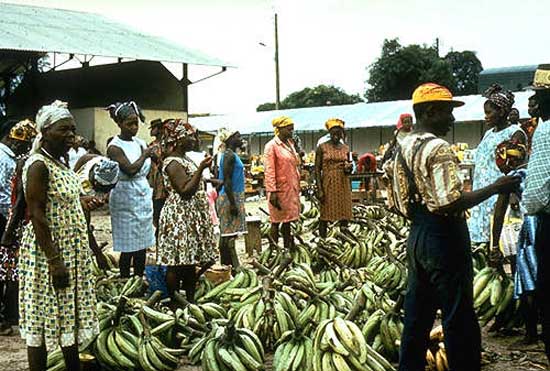
In 1999, Marcia Parkes was the only African-American in her group of 14 people to travel to Gabon--a scenario that is way too common, she says
On a Mission: Sisters in the Peace Corps
Black women are in demand to represent America in the Motherland--so that's just what these two women did
Related Stories
A Tradition of Giving--and Getting--Back
If you have ever wondered how Africans feel about African-Americans, ask Peace Corps volunteers. They will tell you that many Africans know very little about us yet yearn to discuss our common ancestry.
Katrina Mathis, who fulfilled one of her keenest desires when she became a Peace Corps volunteer, spent two years (1994 to 1996) in Guinea, west Africa. Although people there were aware that many slaves taken from the west coast of Africa hundreds of years ago had ended up in America, notes Mathis, they were awestruck to see and talk to a descendant of one of those slaves--and to find out what it was like to be a Black person in America.
"One of my fondest memories was walking through the open-air market and hearing people whisper to one another, 'American noire, American noire' [Black American, Black American]," recalls Mathis, who had dreamed of serving in the Peace Corps since eighth grade. She recently moved from Atlanta to Washington, D.C., to work with Americorps, a network of national community-service programs.
Marcia Parkes had a slightly different experience as a volunteer (1999 to 2001) in Gabon, a small country in central Africa. "Many people were surprised to learn that there were African-Americans--not just Caucasians--living in America," she says. "They were very curious about us." For Parkes, helping to shape the way Africans view African-Americans was a big benefit of being a Peace Corps volunteer.
Both Mathis and Parkes belong to the Minority Peace Corps Association (MPCA), a nonprofit group founded in 2001 by volunteers who have returned from their Peace Corps service. Through special events and outreach activities, the MPCA serves to broaden awareness of the Peace Corps among people of color.
The MPCA is also working with the Peace Corps, which announced in July 2002 its goal of boosting the number of minority-group members within its ranks. Currently, 15 percent of the Peace Corps' 7,000 members are ethnic minorities. The organization is also seeking to double the total number of volunteers by 2007.
The way Parkes sees it, there isn't just a shortage of Black people serving as Peace Corps volunteers. She also points out the need for Latinas and Latinos in the Peace Corps because of the ancestry and language they share with so many of the countries served. "We are the face of America, and the rest of the world needs to see that," says Parkes, who shares her Peace Corps experience with the NiaOnline community.
Parkes first became interested in the Peace Corps as an undergraduate at the University of Buffalo in New York after reading a flyer on a campus bulletin board. She thought how exciting it must be to travel to a foreign land, learn another language, and experience a different culture.
Still not quite ready to volunteer, however, she went on to complete graduate studies in business administration at Howard University and worked a year and a half as an event planner. At that point, in 1997, Parkes, then age 32, again began considering joining the Peace Corps.
I was wrestling with whether or not it was practical for me to go into the Peace Corps. There are many of us who are minorities who don't have the luxury of taking two years out of our lives to go overseas to volunteer. Oftentimes we are the first ones in our families to graduate from college. So there are certain financial obligations to the family. We are forced to go immediately into the workforce, and our families are not always receptive to us doing otherwise. It took me almost two years to make up my mind that this is what I really wanted to do.
In 1999, Parkes was the only African-American in her group of 14 people to travel to Gabon--a scenario that is way too common, she says. She served in the area of agricultural marketing, working with rural farmers, whom she notes were very welcoming and nurturing.
I was stationed in the city but worked in the fields, traveling from village to village. Peace Corps has a slogan: "It's the toughest job you'll ever love." It's so true. It was a very challenging job, but it was so good for me to get out of my element. It was a dream of mine, and I know I would have regretted not going.
Parkes, who lives in the nation's capital, now works for the U.S. General Services Administration, the administrative-services and real estate arm of the federal government. Her experience in the Peace Corps, she says, helped her to become a better communicator and liaison between her agency and the general public.
Want to learn more about the Peace Corps, or find out whether you have what it takes? Check out the Related Story "A Tradition of Giving--and Getting--Back," above.
Have you or anyone you know volunteered with the Peace Corps? What was the experience like? Tell us in the comments section below.
--Carolyn M. Brown is a New Jersey-based writer
